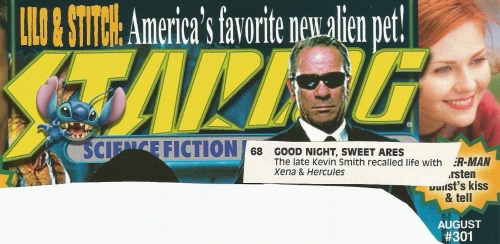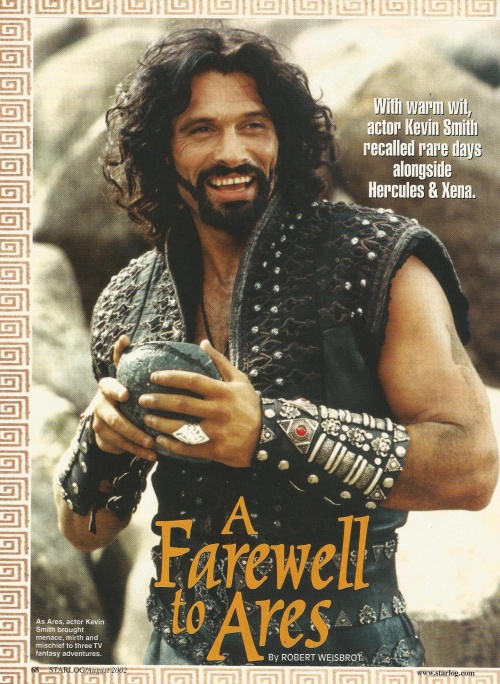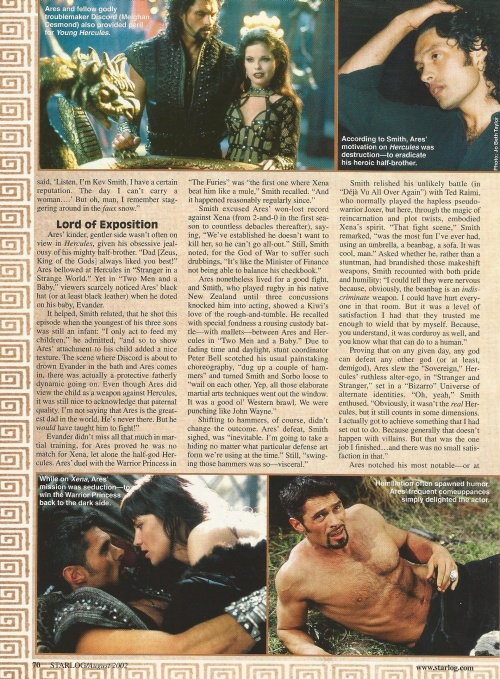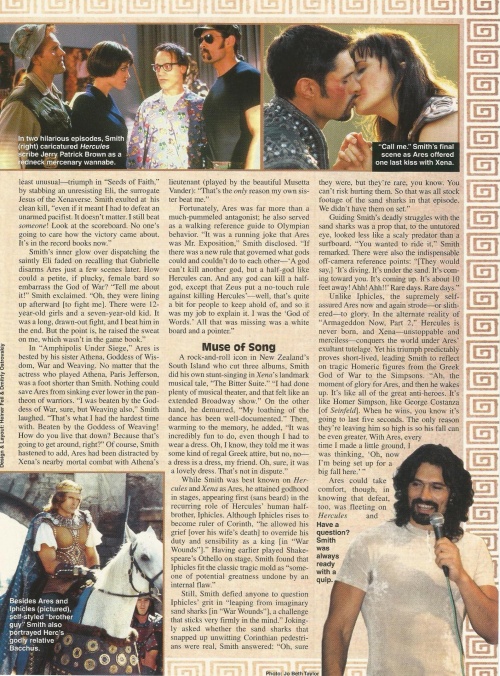A Farewell to Ares - Starlog - 2002 (August)
This article is from the magazine Starlog, dated August 2002, featuring Kevin Smith.
The high-res magazine scans are from Bryn.
~*~
Good night, sweet Ares - The late Kevin Smith recalled life with Xena & Hercules
With warm wit, actor Kevin Smith recalled rare days alongside Hercules & Xena.
As Ares, actor Kevin Smith brought menace, mirth and mischief to three TV fantasy adventures.
A friendly presence at SF conventions, Smith loved meeting his fans.
Smith first appeared on The Legendary Journeys as Iphicles, human half-brother to Hercules (Kevin Sorbo).
With "a license to be naughty," Ares often taunted and tempted woman warrior Xena (Lucy Lawless).
Ares and fellow godly troublemaker Discord (Meighan Desmond) also provided peril for Young Hercules.
According to Smith, Ares' motivation on Hercules was destruction - to eradicate his heroic half-brother.
While on Xena, Ares' mission was seduction - to win the Warrior Princess back to the dark side.
Humiliation often spawned humor. Ares' frequent comeuppances simply delighted the actor.
In two hilarious episodes, Smith (right) caricatured Hercules scribe Jerry Patrick Brown as a redneck mercenary wannabe.
"Call me." Smith's final scene as Ares offered one last kiss with Xena.
Besides Ares and Iphicles (pictured), self-styled "brother guy" Smith also portrayed Herc's godly relative Bacchus.
Have a question? Smith was always ready with a quip.
Expert at sibling revelry and seductive rivalry, Smith demonstrated that even the bad guy can be good.
A Farewell to Ares
by Robert Weisbrot
Appearing as Ares, the God of War, in nearly 70 episodes of Hercules: The Legendary Journeys, Xena: Warrior Princess and Young Hercules, New Zealand actor Kevin Smith set Olympic records for mischief by a Greek deity that may never be equaled. Off-screen, though, the ruggedly handsome Smith was known among cast and crew as a lightning-quick god of wit and warmth. In two extended interviews months before his accidental death in Beijing at age 38 in February, Smith shared his engagingly subversive take on the master of arms who could charm as well as conquer - and who never gave up trying to lure the Warrior Princess to his side in both martial and marital bliss.
"They wanted a character," recalled Smith (previously profiled in STARLOG #258), "who could foot it with Xena on any level, which immediately knocked out 99 percent of mortal men. And, most importantly, they wanted a level of heat. The subtext of seduction was always there, a sexual tension, though it was never fully overt until the fifth season 'funk-out' when Ares becomes suddenly besotted with Xena.
Ares wreaked havoc with equal glee on Hercules and Xena, but according to Smith, his aims on those shows couldn’t have been further apart. "With Hercules, the agenda was pretty clear: Ares' mission was to destroy Hercules [Kevin Sorbo], to undermine him in some way. But one of Ares' prominent objectives on Xena was to woo Xena [Lucy Lawless] back to the dark side, or even, as it turned out later on, just to woo her. And obviously that difference affected the way the character operated. Not that I played him as a different person, but as in our own lives, people see one side of you in your working life, and another in your home life. In the Hercules Universe, that [destructive] face of Ares is most often seen. There’s less [inner] conflict because Ares isn't being pulled in two different directions. But on Xena he is [torn]: 'Do I kill her? Do we move in together and pick out lawn furniture? What do we do? '"
God of War
Despite the rebuffs and insults, Ares persisted in wooing and watching over Xena. The injustice of this unrequited pining was not lost on Smith, who wailed, "This is the thing - when Ares tries to be a good guy, he can’t get a break! Sure, I mean, OK, there’s the downside of the ledger: He has killed some people Xena was really fond of. Yeah, sure, there’s that. But in their interpersonal dealings, I think he has shown a huge amount of tolerance and restraint. He has never set out to actually destroy her. True, there was that one time that Ares set the Furies on Xena, but driving someone mad can be just a way of saying, 'Hey, loosen up! Have some "me" time. Have some fun!'"
Although Ares was dismissive of Xena's friend Gabrielle ("the annoying blonde"), he could be surprisingly playful with her, as in "The Quill is Mightier". Smith related: "Originally, the script was meant to finish with a lingering look between Renée [O'Connor, as Gabrielle] and me. We’re almost kissing, and Ares suddenly disappears. But on the day of the shoot, we just thought, 'We can’t do this.'" To give their sweet farewell a tart edge, Ares playfully flicks Gabrielle’s nose as she stands poised for a kiss, then he vanishes with a laugh. "Just another little humiliation," Smith observed, "but for Gabrielle this time."
Whenever Xena and Gabrielle seemed certain that Ares was irredeemably loathsome, he cunningly kept them off balance by perpetrating a good deed. In "Motherhood", the God of War discards his immortality to save Xena (and, in so doing, Gabrielle as well). And earlier - in "Looking Death in the Eye" - Ares reveals a soft core beneath his hard-edged plotting when he buries the seemingly lifeless Xena and Gabrielle together. "It was an understanding," Smith explained. "I can never be with you, so you might as well be with the other person who loved you."
Smith found that scene draining, and not simply emotionally. "I had just come back from Pasadena [for a convention] and got wickedly ill; I lost about five kilos. And there were all these shots where I had to carry Xena's body across the frozen tundra, and one where I had to actually walk her up a hill. I was absolutely [exhausted] and had to sit down in between takes. They said, 'Oh, to you want someone else to [carry her]?' I said, 'Listen, I'm Kev Smith. I have a certain reputation. The day I can’t carry a woman....' But oh, man, I remember staggering around in the faux snow."
Lord of Exposition
Ares' kinder, gentler side wasn’t often on view in Hercules, given his obsessive jealousy of his mighty half-brother. "Dad [Zeus, King of the Gods] always liked you best!" Ares bellowed at Hercules in "Stranger in a Strange World." Yet in "Two Men and a Baby," viewers scarcely noticed Ares' black hat (or at least black leather) when he doted on his baby, Evander.
It helped, Smith related, that he shot this episode when the youngest of his three sons was still an infant: "I only act to feed my children," he admitted, "and so to show Ares' attachment to his child added a nice texture. The scene where Discord is about to drown Evander in the bath and Ares comes in, there was actually a protective fatherly dynamic going on. Even though Ares did view the child as a weapon against Hercules, it was still nice to acknowledge that paternal quality. I’m not saying that Ares is the greatest dad in the world. He’s never there. But he would have taught him to fight!"
Evander didn't miss all that much in martial training, for Ares proved he was no match for Xena, let alone the half-god Hercules. Ares' duel with the Warrior Princess in "The Furies" was "the first one where Xena beat him like a mule," Smith recalled. "And it happened reasonably regularly since."
Smith excused Ares' won-lost record against Xena (from 2-and-0 in the first season to countless debacles thereafter), saying "We've established he doesn't want to kill her, so he can't go all-out." Still, Smith noted, for the God of War to suffer such drubbings, "It's like the Minister of Finance not being able to balance his checkbook."
Ares nonetheless lived for a good fight, and Smith, who played rugby in his native New Zealand until three concussions knocked him into acting, showed a Kiwi's love of the rough-and-tumble. He recalled with special fondness a rousing custody battle with mallets between Ares and Hercules in "Two Men and a Baby". Due to fading time and daylight, stunt coordinator Peter Bell scotched his usual painstaking choreography, "dug up a couple of hammers" and turned Smith and Sorbo loose to "wail into each other. Yep, all those elaborate martial arts techniques went out the window. It was a good ol' Western brawl. We were punching like John Wayne."
Shifting to hammers, of course, didn't change the outcome. Ares' defeat, Smith sighed, was "inevitable. I'm going to take a hiding no matter what particular defense art form we're using at the time." Still, "swinging those hammers was so - visceral."
Smith relished his unlikely battle (in "Déjà vu All Over Again") with Ted Raimi, who normally played the hapless pseudo-warrior Joxer, but here, through the magic of reincarnation and plot twists, embodied Xena's spirit. "That fight scene," Smith remarked, "was the most fun I've ever had, using an umbrella, a beanbag, a sofa. It was cool, man." Asked whether he, rather than a stuntman, had brandished those makeshift weapons, Smith recounted with both pride and humility: "I could tell they were nervous because, obviously, the beanbag is an indiscriminate weapon. I could have hurt everyone in that room. But it was a level of satisfaction I had that they trusted me enough to wield that by myself. Because, you understand, it was corduroy as well, and you know what that can do to a human."
Proving that on any given day, any god can defeat any other god (or at least, demigod), Ares slew the "Sovereign", Hercules' ruthless alter-ego, in "Stranger and Stranger", set in a "Bizarro" Universe of alternate identities. "Oh, yeah," Smith enthused. "Obviously it wasn’t the real Hercules, but it still counts in some dimensions. I actually got to achieve something that I had set out to do. Because generally that doesn't happen with villains. But that was the one job I finished... and there was no small satisfaction in that."
Ares notched his most notable - or at least unusual - triumph in "Seeds of Faith," by stabbing an unresisting Eli, the surrogate Jesus of the Xenaverse. Smith exulted at his clean kill, "even if it meant I had to defeat an unarmed pacifist. It doesn’t matter. I still beat someone! Look at the scoreboard. No one's going to care how the victory came about. It's in the record books now."
Smith's inner glow over dispatching the saintly Eli faded on recalling that Gabrielle disarms Ares just a few scenes later. How could a petite, if plucky, female bard so embarrass the God of War? "Tell me about it!" Smith exclaimed. "Oh, they were lining up afterward [to fight me]. There were 12-year-old girls and a seven-year-old kid. It was a long, drawn-out fight, and I beat him in the end. But the point is, he raised the sweat on me, which wasn't in the game book."
In "Amphipolis Under Siege," Ares is bested by his sister Athena, Goddess of Wisdom, War and Weaving. No matter that the actress who played Athena, Paris Jefferson, was a foot shorter than Smith. Nothing could save Ares from sinking ever lower in the pantheon of warriors. "I was beaten by the Goddess of War, sure, but Weaving also," Smith laughed. "That's what I had the hardest time with. Beaten by the Goddess of Weaving! How do you live that down? Because that's going to get around, right?" Of course, Smith hastened to add, Ares had been distracted by Xena's nearby mortal combat with Athena's lieutenant (played by the beautiful Musetta Vander): "That’s the only reason my own sister beat me."
Fortunately, Ares was far more than a much-pummeled antagonist; he also served as a walking reference guide to Olympian behavior. "It was a running joke that Ares was Mr. Exposition," Smith disclosed. "If there was a new rule that governed what gods could and couldn't do to each other - 'A god can't kill another god, but a half-god like Hercules can. And any god can kill a half-god, except that Zeus put a no-touch rule against killing Hercules' - well, that's quite a bit for people to keep ahold of, and so it was my job to explain it. I was the 'God of Words.' All that was missing was a white board and a pointer."
Muse of Song
A rock-and-roll icon in New Zealand's South Island who cut three albums, Smith did his own stung-singing in Xena's landmark musical tale, "The Bitter Suite." "I had done plenty of musical theater, and that felt like an extended Broadway show." On the other hand, he demurred, "My loathing of the dance has been well-documented." Then, warming to the memory, he added, "It was incredibly fun to do, even though I had to wear a dress. Oh, I know, they told me it was some kind of regal Greek attire, but no, no - a dress is a dress, my friend. Oh, sure, it was a lovely dress. That's not in dispute."
While Smith was best known on Hercules and Xena as Ares, he attained godhood in stages, appearing first (sans beard) in the recurring role of Hercules' human half-brother, Iphicles. Although Iphicles rises to become ruler of Corinth, "he allowed his grief [over his wife's death] to override his duty and sensibility as a king [in "War Wounds"]. Having earlier played Shakespeare's Othello on stage, Smith found that Iphicles fit the classic tragic mold as "someone of potential greatness undone by an internal flaw."
Still, Smith defied anyone to question Iphicles grit in "leaping from imaginary sand sharks [in "War Wounds"], a challenge that sticks very firmly in the mind." Jokingly asked whether the sand sharks that snapped up unwitting Corinthian pedestrians were real, Smith answered: "Oh, sure they were, but they're rare, you know. You can't risk hurting them. So that was all stock footage of the sand sharks in that episode. We didn't have them on set."
Guiding Smith's deadly struggles with the sand sharks was a prop that, to the untutored eye, looked less like a scaly predator than a surfboard. "You wanted to ride it," Smith remarked. There were also the indispensable off-camera reference points: "[They would say,] 'It's diving. It's under the sand. It's coming toward you. It's coming up. It's about 10 feet away! Ahh! Ahh!!' Rare days. Rare days."
Unlike Iphicles, the supremely self-assured Ares now and again strode - or slithered - to glory. In the alternate reality of "Armageddon Now, Part 2," Hercules is never born, and Xena - unstoppable and merciless - conquers the world under Ares' exultant tutelage. Yet his triumph predictably proves short-lived, leading Smith to reflect on tragic Homeric figures from the Greek God of War to the Simpsons. "Ah, the moment of glory for Ares, and then he wakes up. It's like Homer Simpson, like George Costanza [of Seinfeld]. When he wins, you know it's going to last five seconds. The only reason they're leaving him so high is so his fall can be even greater. With Ares, every time I made a little ground, I was thinking, 'Oh, now I'm being set up for a big fall here.'"
Ares could take comfort, though, in knowing that defeat, too, was fleeting on Hercules and Xena even his fade into invisibility and seeming oblivion in "Fade Out," in which he shatters the cursed eye of a Cyclops. "Yeah, I don't think anyone troubled themselves to explain how he appeared in the next episode," Smith shrugged. "That was just a hiccup [for Ares]. 'Doom happens.' You deal with it. You move on. You've gotta let go, man. That stuff will drag you down."
Like the ancient Greeks, Hercules and Xena interspersed their tragic tales with often bawdy comedies, and Smith showed special flair in trading his sword for a banana peel. "For some reason," he grinned, "I love it when Ares gets humiliated."
Man of Action
Ever the "pragmatic jobbing actor," Smith played scenes opposite diverse barnyard fauna, most poignantly after Sorbo's illness led writers to cast a spell that changed Hercules into the world's mightiest pig. "Well, Babe had just come out," Smith explained, gallantly defending the logic of "Porkules," "so we realized that people would watch pigs." Still, Smith conceded that it was challenging holding the camera against a bright-eyed hog. "Let's face it: There are cute animals, and some that aren't so cute, but the porcine variety definitely ranks up there in cuteness - they're pink and they have little button eyes. You pretty much [employ] the same techniques you use when acting with children. But they garner much more attention than any adult, no matter how suave or well-spoken. It's all about survival."
No sooner had Smith mastered the art of emoting to a pig than "Yes, Virginia, There Is a Hercules" provided him with a change of identity (as Hercules head writer Jerry Patrick Brown) and a urinal, when four Hercules staff writers wander into the men's room and join in a manly humming of the show's rousing theme music. Praised for his sensitive choral humming, Smith took the plaudits in stride, saying, "We all had to go through a crash course on the theme. We thought we were ready, but no one could get it right. [He offered an off-key humming exhibition.] 'No, no, man. Not like that!' So they got a recording of it and told us, 'Here it is. Learn it!' You see, actors are such vain creatures that when you're watching an episode on tape, you fast-forward through the opening credits because you want to get to your own scenes, right? 'Oh, there’s a tune to this show?'"
The actor saved his most daring inspiration for the final scene in Hercules, when he bade farewell to his character and costume in one grand gesture. "There's footage somewhere of the first take we did of Ares walking off into the desert, and I saw spin-off all over it," he said. "I could be the new David Carradine [echoing the credits sequence of the 1970s cult TV hit Kung Fu), wandering the Earth, righting wrongs - or in my case, wronging rights. But as I walked off, I thought, 'Oh, what the hell,' and I just started taking my clothes off. So by the time I got to the crest of the hill, Ares is dropping his pants, sobbing, sobbing, heaving like a child, his bare bottom to the world. They didn’t use it. I don't know why."
Smith, whose acting legacy is so entwined with his charismatic portrayal of Xena's divine adversary and admirer, felt an emotional jolt on filming his very last episode, Xena's "Soul Possession". In "one of those classic encounters," Ares materializes in a forest and "Xena stands still," Smith noted. "Ares walks around her, they kiss and then he says, 'Call me.' As we walked back to the trailers, Luce said, 'That's the last scene like that we'll ever do, isn’t it?' And I thought, 'This is the last time I'll ever wear my Ares costume.' That was when it really got to me. Yeah, those boots were a drag to put on, but I looked at that costume hanging there and I thought, 'Man, I've spent six years in that. And I'll never again ....' It was weird. It was so emotionally resonant for me."
The death of the Warrior Princess in the series' finale led some viewers to express outrage, but Smith praised producer Rob Tapert for taking chances right to the end. "I love the finality of it. And, in a way, it does satisfy. At some point, it had to end, but I guess we're thinking, 'She's gone to a better place.'"
Despite moving smoothly from Xena and Hercules to stage and screen work, Smith's larger-than-life aura as the God of War continued to transfix - and amuse - audiences. "I'm just finishing a season of "A Streetcar Named Desire," Smith said last July, "and I'm enjoying my time back in the theater, but even here, the Grecian references pursue me. I mean, my [character's] home is on Elysian Fields? Please! And in scene five of the play, Blanche says, 'What sign were you born under?' I say, 'Sign?' and she says, 'Yes, astrological sign. I bet you were born under Aries. Aries people are forceful and dynamic. They love to bang things around!' That always gets a titter in the house."
Kevin Smith decided not to fight the enduring burden of godhood. "I can't get away from it, man," he said in mock despair. Then he added, with a gleam worthy of Ares, "Obviously, I’m just going to have to move to Greece."





